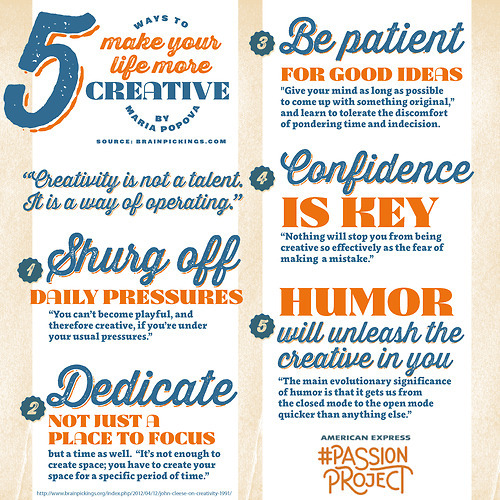(Reblogged from Explore Blog and Brain Pickings)
“Creativity is not a talent. It is a way of operating.”
Much has been said about how creativity works, its secrets, its origins, and what we can do to optimize ourselves for it. In this excerpt from his fantastic 1991 lecture, John Cleese offers a recipe for creativity, delivered with his signature blend of cultural insight and comedic genius. Specifically, Cleese outlines “the 5 factors that you can arrange to make your lives more creative”:
- Space (“You can’t become playful, and therefore creative, if you’re under your usual pressures.”)
- Time (“It’s not enough to create space; you have to create your space for a specific period of time.”)
- Time (“Giving your mind as long as possible to come up with something original,” and learning to tolerate thediscomfort of pondering time and indecision.)
- Confidence (“Nothing will stop you being creative so effectively as the fear of making a mistake.”)
- Humor (“The main evolutionary significance of humoris that it gets us from the closed mode to the open mode quicker than anything else.”)
Creativity is not a talent. It is a way of operating.
We need to be in the open mode when pondering a problem — but! — once we come up with a solution, we must then switch to the closed mode to implement it. Because once we’ve made a decision, we are efficient only if we go through with it decisively, undistracted by doubts about its correctness.
Cleese goes on to caution against a trap in this duality, one particularly hazardous in politics:
To be at our most efficient, we need to be able to switch backwards and forward between the two modes. But — here’s the problem — we too often get stuck in the closed mode. Under the pressures which are all too familiar to us, we tend to maintain tunnel vision at times when we really need to step back and contemplate the wider view.This is particularly true, for example, of politicians. The main complaint about them from their nonpolitical colleagues is that they’ve become so addicted to the adrenaline that they get from reacting to events on an hour-by-hour basis that they almost completely lose the desire or the ability to ponder problems in the open mode.
Cleese concludes with a beautiful articulation of the premise and promise of his recipe for creativity:
This is the extraordinary thing about creativity: If just you keep your mind resting against the subject in a friendly but persistent way, sooner or later you will get a reward from your unconscious.
No copyright infringement intended. For educational, non-commercial purposes only.

No comments:
Post a Comment
Note: Only a member of this blog may post a comment.